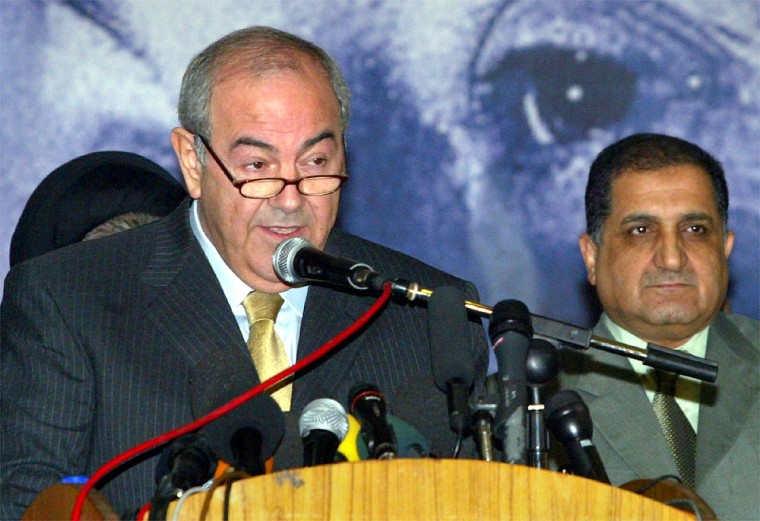Campaigning in Iraq’s first national elections since Saddam Hussein’s ouster began Wednesday under the shadow of a rampant insurgency, with interim Prime Minister Ayad Allawi announcing his candidacy and the defense minister accusing Iranian and Syrian agents of aiding the militants.
Surrounded by supporters in tribal garb, clerical turbans and smart suits, Allawi announced Wednesday that he will stand at the polls backed by a 240-member list of candidates meant to highlight his appeal to Iraq’s diverse and sometimes fractious ethnic and religious groups.
Meanwhile, the United Nations intends to open two offices outside Baghdad following pressure from Washington and Iraqi authorities to provide more help before the elections, officials said Wednesday.
Four or five additional U.N. staffers will be assigned to each of the planned offices in Basra in southern Iraq and Erbil in the north, once their security can be assured and residences and offices set up, the United Nations said.
The U.N. ceiling for international staff in Iraq had been 59, including 25 election experts — all based in Baghdad. But Iraq's U.N. ambassador, Samir Shakir Sumaidaie, complained to the Security Council that more help was needed.
The staff ceiling was raised to 210 Wednesday to reflect the deployment of 150 troops from Fiji to guard U.N. staff and facilities, U.N. officials said.
U.S. Ambassador John Danforth welcomed the announcement.
"The more the better is basically our position, so I don't know that there would ever be a number when we would say that's enough. But we think this is certainly moving in the right direction," he told reporters.
Also on Wednesday, Iraq's defense ministry said Ali Hassan al-Majid, better known as "Chemical Ali," will be the first of Saddam Hussein's top deputies to face trial.
Hazim al-Shaalan said the initial hearings could begin next week and would definitely take place by mid-January — days before Iraq holds its first post-Saddam election.
Vow to shun fanaticism
The U.S.-backed Allawi pledged his supporters that he would work for national unity and move away from “religious and ethnic fanaticism” if elected.
“By depending on God, and with a firm determination and based on strong confidence in the abilities of our people, we are capable of confronting the difficulties and challenges and of making a bright future for our honorable people,” Allawi said.
Allawi said his party would push for the eventual withdrawal of multinational forces.
“Rebuilding the army and the forces of national safety enable us to work on asking for the final withdrawal of the multinational forces from our beloved country according to a set timetable,” he said.
Many in Iraq fear that the campaigning period will be targeted by insurgents opposed to the election.
Iran is ‘No. 1 enemy’
Defense Minister Hazem Shaalan accused Iranian and Syrian agents of cooperating with former Saddam security operatives and Iraq’s top terror figure — Abu Musab al-Zarqawi — “to run criminal operations in Iraq.” Shaalan also sharply criticized one of the main Iraqi factions competing with Allawi in the election, calling it too close to Iran.
Iran’s role in the insurgency was discovered after the arrest last month of the leader of another group, Mohammed’s Army, which officials have said is linked to al-Zarqawi.
“When we arrested the commander ... we discovered that the key to terrorism is in Iran, which is the No. 1 enemy for Iraq,” Shaalan said.
“They are fighting us because we want to build freedom and democracy and they want to build an Islamic dictatorship and have turbaned clerics to rule in Iraq,” he said.
Al-Zarqawi’s group is believed to be leading a brutal campaign of hostage-takings, beheadings and bombings that victimize Americans and Iraqis. U.S. officials have offered a $25 million bounty for al-Zarqawi, a Jordanian militant.
Iran and Syria have rejected U.S. and Iraqi claims they support Iraq’s insurgency, but Damascus has said it is unable to fully close its long, porous border with its neighbor.
Shaalan’s comments may have been aimed at trying to stir up sentiment against the United Iraqi Alliance, a leading coalition of mainly Shiite candidates, some with close ties to Iran, which is expected to do well in the vote.
He took a swipe at an architect of the 228-member coalition and leading member, nuclear physicist Hussain al-Shahristani, describing him as the “leader of an Iranian list” that wants to Iraq to be run similar to its Shiite-dominated neighbor.
Shiites, who make up around 60 percent of Iraq’s population, are expected to dominate the elections, and the United Iraqi Alliance has the backing of the most influential Shiite cleric, Ayatollah Ali al-Sistani.
In northern Iraq, Kurdish officials demanded that provincial elections that are being held at the same time as the national vote be postponed.
The Kurds will boycott the provincial elections if their demands were not met, said Kamal Kirkukly, a council member and an official of the Kurdistan Democratic Party, one of Iraq’s two main Kurdish parties, in an interview with The Associated Press.
Among their demands is the return of displaced Kurds to the ethnically mixed city of Kirkuk, where Saddam’s regime drove out many Kurds and replaced them with Arabs from other areas. The Kurds apparently want to solidify their demographic presence in the city before any vote. There was no suggestion the Kurds would boycott the national vote.
